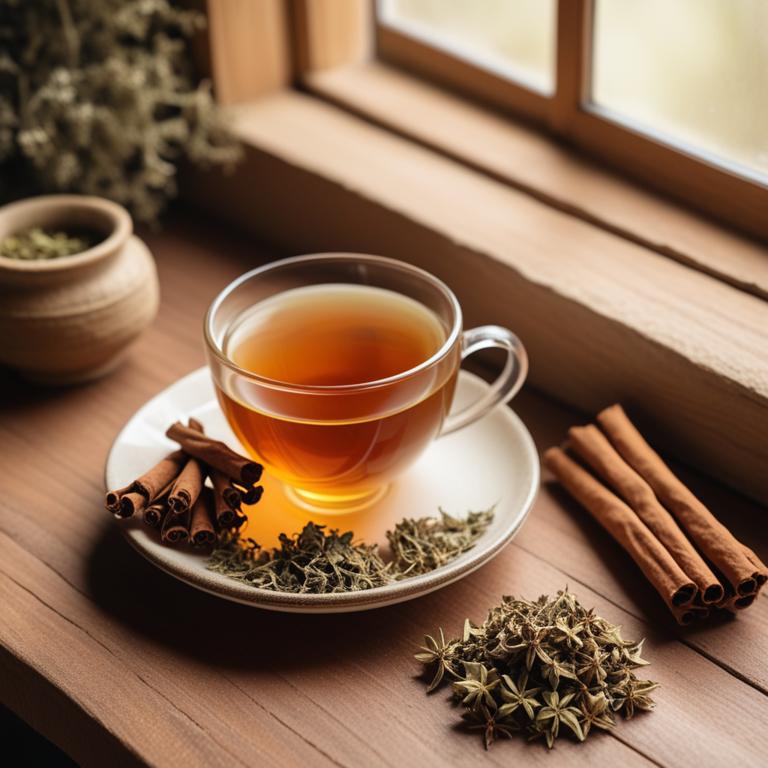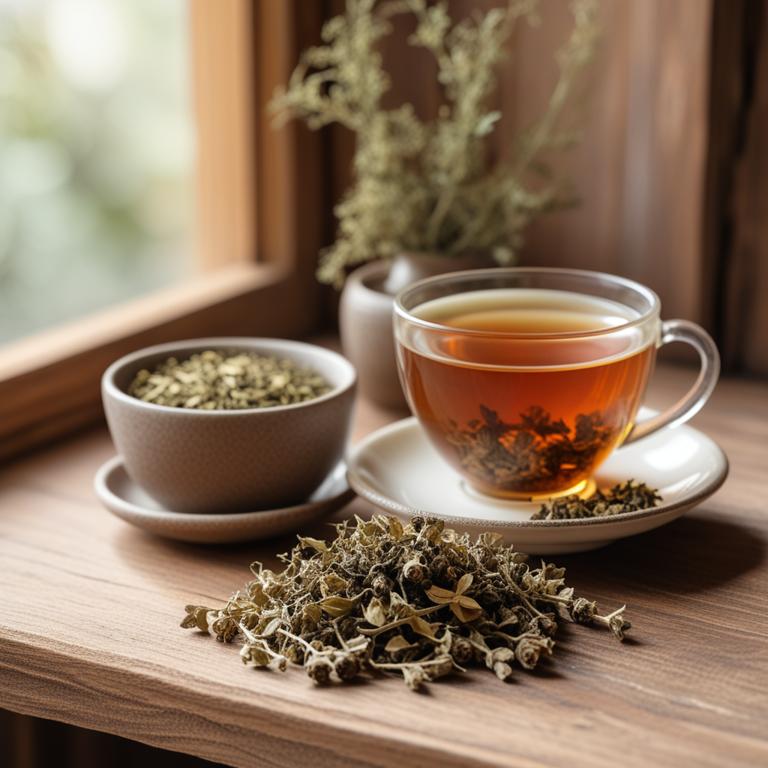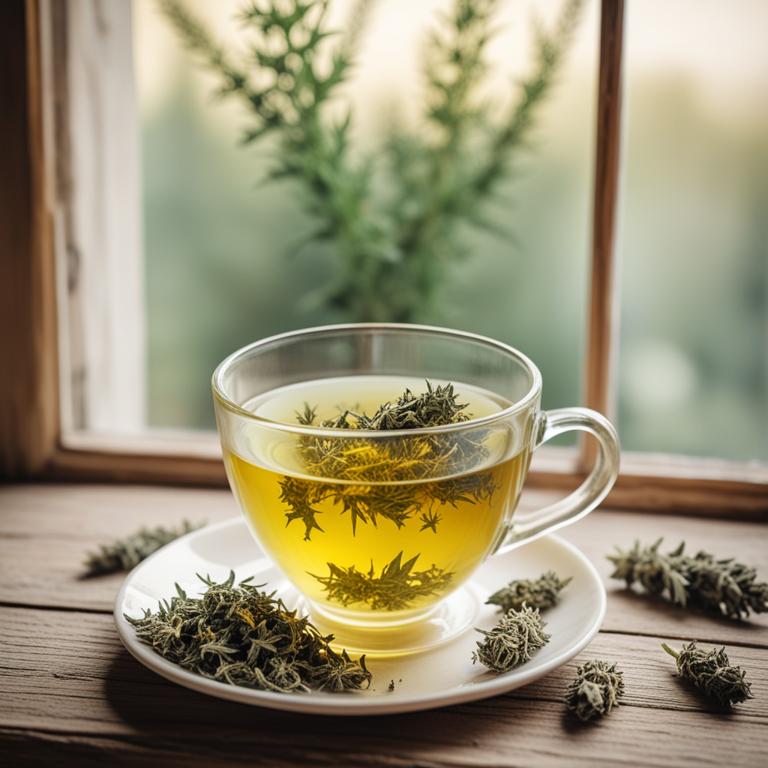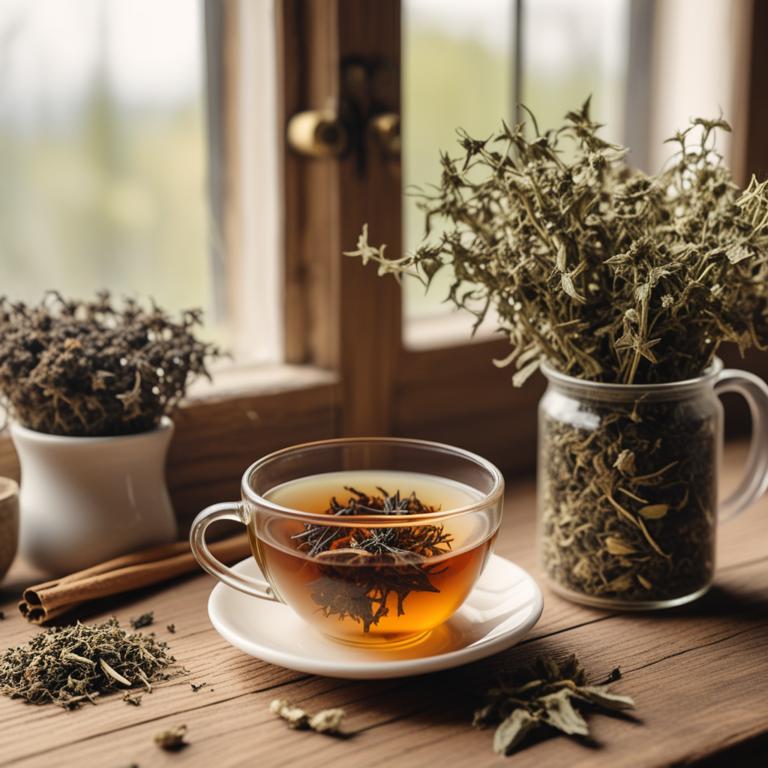11 Best Herbal Teas For Acid Reflux

Herbal teas for acid reflux are a natural remedy used to alleviate the symptoms of gastroesophageal reflux disease (GERD), a condition characterized by the backflow of stomach acid into the esophagus, causing heartburn and discomfort.
These teas work by soothing the digestive system, reducing inflammation, and promoting relaxation, which can help alleviate the symptoms of acid reflux.
Examples of herbal teas that can be used to treat acid reflux include ginger tea, which helps to reduce inflammation and ease nausea; chamomile tea, which promotes relaxation and reduces anxiety; peppermint tea, which helps to ease digestion and reduce heartburn; licorice root tea, which soothes the digestive system and reduces inflammation; fennel tea, which helps to ease digestion and reduce bloating; and slippery elm tea, which soothes the digestive system and reduces inflammation.
By incorporating these herbal teas into their diet, individuals can find relief from the symptoms of acid reflux and promote overall digestive health.
Related Study
According to the study, teas for acid reflux that are rich in antioxidants and anti-inflammatory properties, such as those derived from medicinal plants like Myrtus communis, Cydonia oblonga, and Ceratonia siliqua, may help alleviate symptoms related to gastroesophageal reflux disease (GERD).
Below there's a list of the 11 best herbal teas for acid reflux.
Table of Contents
Also, you may be interested in...
Today Free Bonus!
The Ultimate Herb Drying Checklist
(For Long-Lasting Powerful Medicinal Effect)
How to easily dry herbs that don't mold and that keep their strong medicinal power for more than 1 year.
1. Glycyrrhiza glabra teas

Glycyrrhiza glabra teas, derived from the root of the licorice plant, have been traditionally used to treat acid reflux ailment due to their anti-inflammatory and soothing properties.
The bioactive constituents, including glycyrrhizin, flavonoids, and saponins, help to reduce inflammation in the esophagus and alleviate symptoms of acid reflux, such as heartburn and regurgitation.
Glycyrrhiza glabra teas work by protecting the mucous membranes of the esophagus, reducing the production of stomach acid, and enhancing the digestion of food, thereby providing relief from acid reflux symptoms.
The benefits of using Glycyrrhiza glabra teas to treat acid reflux include reduced inflammation, improved digestion, and alleviated symptoms, making it a natural and effective remedy for this common ailment.
Related Study
According to "Molecules (Basel, Switzerland)", Glycyrrhiza glabra teas for acid reflux may be beneficial due to the presence of glycyrrhizic acid, which was found in NADES extracts from the roots of G. glabra, although the study found no health risks associated with these extracts.
Recipe:
- Gather 2 tablespoons of dried Glycyrrhiza glabra root powder and 1 cup of boiling water.
- Steep the powder in the boiling water for 5-7 minutes.
- Strain the mixture using a fine-mesh sieve into a cup.
- Add 1 tablespoon of honey (optional) to the tea for taste.
- Drink the tea slowly and wait for 30 minutes to feel the relief from acid reflux.
Glycyrrhiza glabra teas can be used to treat acid reflux, but excessive consumption may lead to side effects such as high blood pressure, low potassium levels, and changes in the body's ability to respond to stress, potentially exacerbating the condition.
Precautions should be taken when using Glycyrrhiza glabra teas to treat acid reflux, including limiting consumption to moderate amounts, avoiding prolonged use, and monitoring blood pressure and potassium levels to prevent complications.
Glycyrrhiza Glabra Tea on Amazon
Pukka Herbal Teas Licorice and Cinnamon - 20 Bags, 20 Count
Disclaimer: We earn a commission if you click this link and make a purchase at no additional cost to you.
2. Zingiber officinale teas

Zingiber officinale teas, derived from the rhizome of the ginger plant, have been traditionally used to treat acid reflux due to their anti-inflammatory and carminative properties.
These properties help to reduce inflammation in the esophagus and alleviate symptoms of acid reflux such as heartburn and regurgitation.
The bioactive constituents of Zingiber officinale teas, including gingerols and shogaols, have been shown to relax the lower esophageal sphincter, reduce gastric acid secretion, and improve digestion, thereby providing relief from acid reflux symptoms.
Regular consumption of Zingiber officinale teas has been found to be beneficial in treating acid reflux, as it helps to soothe the stomach lining, reduce inflammation, and promote overall digestive health.
Related Study
According to "Journal of ethnopharmacology", Zingiber officinale teas for acid reflux may be beneficial due to the presence of compounds such as lariciresinol, which has been found to inhibit efflux pumps in bacteria, potentially enhancing the effectiveness of antibiotics and reducing the risk of antibiotic resistance.
Recipe:
- Gather 1 cup of water, 1 tablespoon of fresh ginger, and a strainer.
- Peel the ginger and chop it into small pieces.
- Boil the water in a pot and add the chopped ginger.
- Let it boil for 5-7 minutes, then turn off the heat and let it steep for 2-3 minutes.
- Strain the tea into a cup and drink it slowly, ideally after meals to help with acid reflux.
Zingiber officinale teas can be used to treat acid reflux, but possible side effects may include stomach upset, nausea, and diarrhea due to its spicy and warming properties.
To minimize potential side effects, take Zingiber officinale teas in moderation and avoid consuming it before meals, as it may exacerbate acid reflux symptoms.
Zingiber Officinale Tea on Amazon
FGO Organic Ginger Tea, 100 Count, Eco-Conscious Tea Bags, Caffeine Free, Packaging May Vary (Pack of 1)
Disclaimer: We earn a commission if you click this link and make a purchase at no additional cost to you.
3. Foeniculum vulgare teas

Foeniculum vulgare teas, also known as fennel tea, have been traditionally used to treat acid reflux due to their carminative and antispasmodic properties.
These properties help to reduce inflammation in the esophagus and alleviate symptoms of acid reflux, such as heartburn and regurgitation.
The bioactive constituents present in fennel tea, including anethole and fenchone, have been found to possess anti-inflammatory and antioxidant properties that contribute to its therapeutic effects.
The benefits of using fennel tea to treat acid reflux include reduced symptoms, improved digestion, and a decrease in the risk of complications associated with long-term acid reflux.
Related Study
According to the provided study, Foeniculum vulgare teas may be beneficial in treating acid reflux due to its antispasmodic properties, which help to relax smooth muscles in the gastrointestinal tract.
Recipe:
- Gather 1 cup of fresh Foeniculum vulgare (also known as fennel seeds) and 1 cup of water.
- Add 1 tablespoon of honey (optional) to a tea infuser or a piece of cheesecloth.
- Place the tea infuser or cheesecloth with the honey into a saucepan with 1 cup of water.
- Bring the water to a boil, then reduce heat and let it simmer for 5-7 minutes.
- Strain the tea into a cup and drink it slowly to help soothe acid reflux symptoms.
Foeniculum vulgare teas can be used to treat acid reflux, but it may cause side effects such as allergic reactions, digestive issues, and interactions with other medications, including blood thinners and diabetes medications.
To use Foeniculum vulgare teas safely, take it in moderation, as excessive consumption can lead to adverse effects, and monitor your body's response, especially if you have a history of allergies or are taking other medications.
Foeniculum Vulgare Tea on Amazon
Fennel Tea - 100% Organic and Alkaline - 15 Unbleached/Chemical-Free Fennel Tea Bags - Caffeine-Free, No GMO
Disclaimer: We earn a commission if you click this link and make a purchase at no additional cost to you.
4. Ginkgo biloba teas

Ginkgo biloba teas have been traditionally used to alleviate symptoms of acid reflux, a condition characterized by the backflow of stomach acid into the esophagus.
The anti-inflammatory and antioxidant properties of this herbal preparation help to reduce inflammation and protect the esophageal lining from acid damage.
The bioactive constituents of Ginkgo biloba, including flavonoids, biflavones, and terpenoids, contribute to its therapeutic effects by soothing the digestive tract and promoting the production of mucus that helps to neutralize stomach acid.
Regular consumption of Ginkgo biloba teas has been found to provide relief from acid reflux symptoms, making it a beneficial herbal remedy for individuals suffering from this condition.
Recipe:
- Gather 1 tablespoon of dried Ginkgo biloba leaves and 1 cup of boiling water.
- Measure 1 tablespoon of honey (optional) and set aside.
- Steep the Ginkgo biloba leaves in the boiling water for 5-7 minutes.
- Strain the mixture into a cup and discard the leaves.
- Add the measured honey (if using) and stir well to mix. Drink the tea slowly and carefully.
Ginkgo biloba teas can be used to treat acid reflux, but potential side effects may include stomach upset, diarrhea, and allergic reactions such as hives or itching.
To minimize risks, it is recommended to start with a low dose, monitor your body's response, and avoid consuming Ginkgo biloba teas on an empty stomach to reduce the risk of stomach upset.
Ginkgo Biloba Tea on Amazon
Tai Chi Think Sharp Energizing Tea (Ginseng Ginkgo Biloba) 12 Bags
Disclaimer: We earn a commission if you click this link and make a purchase at no additional cost to you.
5. Cinchona officinalis teas

Cinchona officinalis teas have been traditionally used to treat acid reflux ailments due to their anti-inflammatory and antacid properties, which help to soothe the digestive tract and reduce symptoms of heartburn and indigestion.
The herbal preparation contains bioactive constituents such as quinines, alkaloids, and flavonoids that aid in reducing inflammation and neutralizing stomach acid, thereby providing relief from acid reflux.
By reducing inflammation and neutralizing stomach acid, Cinchona officinalis teas help to alleviate symptoms of acid reflux, including heartburn, bloating, and discomfort.
The benefits of using Cinchona officinalis teas to treat acid reflux include a reduction in symptoms, improved digestion, and a decrease in the risk of complications associated with acid reflux.
Recipe:
- Gather 2 tablespoons of dried Cinchona officinalis bark, 1 cup of boiling water, and a tea infuser or strainer.
- Measure 2 tablespoons of dried Cinchona officinalis bark into the tea infuser or strainer.
- Pour 1 cup of boiling water over the dried bark in the tea infuser or strainer.
- Let it steep for 5-7 minutes, then strain the tea into a cup.
- Drink the tea 1-2 times a day to help manage acid reflux symptoms, as directed by a healthcare professional.
Cinchona officinalis teas can be beneficial in treating acid reflux due to their anti-inflammatory and antacid properties, but possible side effects include allergic reactions, digestive issues, and interactions with other medications that can increase the risk of bleeding.
To use Cinchona officinalis teas safely, it is essential to start with a low dose and gradually increase it, as excessive consumption may lead to nausea, vomiting, and diarrhea, and to avoid mixing it with other herbal remedies or medications that may have similar effects.
Cinchona Officinalis Tea on Amazon
Quina Roja(chinona) & Palo de Víbora Tea – 100% Natural, Vegan, Hecho en México | 25 Tea Bags
Disclaimer: We earn a commission if you click this link and make a purchase at no additional cost to you.
6. Zanthoxylum bungeanum teas

Zanthoxylum bungeanum teas have been traditionally used to treat acid reflux due to their anti-inflammatory and soothing properties, which help to calm the digestive system and reduce inflammation in the esophagus.
The bioactive constituents of this herbal preparation, including ferulic acid, isorhapontigenin, and berberine, exhibit gastroprotective and anti-secretory effects, helping to reduce the production of stomach acid and alleviate symptoms of acid reflux.
By reducing inflammation and modulating the digestive system, Zanthoxylum bungeanum teas can provide relief from acid reflux symptoms, such as heartburn and regurgitation.
Regular consumption of this herbal preparation can also help to prevent future acid reflux episodes and promote overall digestive health, making it a beneficial natural remedy for managing this common gastrointestinal disorder.
Recipe:
- Gather 1 cup of dried Zanthoxylum bungeanum leaves, 2 cups of water, and a strainer.
- Boil 2 cups of water in a pot.
- Add 1 tablespoon of dried Zanthoxylum bungeanum leaves to the boiling water.
- Reduce heat and let it simmer for 5-7 minutes, then strain the tea.
- Drink the tea 2-3 times a day to help relieve acid reflux symptoms.
Zanthoxylum bungeanum teas can be used to treat acid reflux, but it may cause side effects such as stomach upset, diarrhea, and allergic reactions in some individuals, particularly those with pre-existing digestive issues or allergies to plants in the Rutaceae family.
To safely use Zanthoxylum bungeanum teas for acid reflux treatment, it is recommended to start with a small dose and gradually increase as needed, and to avoid consuming it on an empty stomach or mixing it with other herbal preparations that may interact with its active compounds.
7. Mentha x piperita teas

Mentha x piperita teas, also known as peppermint tea, have been traditionally used to treat acid reflux due to their soothing and calming properties.
The menthol and menthone present in peppermint tea help to relax the muscles in the esophagus, reducing inflammation and alleviating the symptoms of acid reflux.
The bioactive constituents of peppermint tea, including limonene, beta-pinene, and alpha-pinene, also exhibit anti-inflammatory and antispasmodic properties that contribute to its therapeutic effects.
By promoting digestion and reducing inflammation, peppermint tea can provide quick relief from acid reflux symptoms, making it a popular natural remedy for this common ailment.
Related Study
According to "Current pharmaceutical biotechnology", Mentha x piperita teas may be beneficial for acid reflux management due to the anti-inflammatory and antioxidant properties of Mentha, which can modulate the expression of transient receptor potential vanilloid type-1 (TRPV1) and suppress 5-hydroxytryptamine 3 (5-HT3) or serotonin receptors.
Recipe:
- Gather 1 cup of fresh mint leaves (Mentha x piperita) and 1 cup of boiling water.
- Add 1 tablespoon of honey (optional) to a cup or mug for added sweetness.
- Pour 1 cup of boiling water over the mint leaves in the cup or mug.
- Let it steep for 5-7 minutes to allow the mint flavors to release.
- Strain the tea and drink it while it's warm to help soothe acid reflux.
Mentha x piperita teas can provide relief from acid reflux symptoms, but may also cause side effects such as digestive upset, allergic reactions, and interactions with other medications, particularly blood thinners and diabetes medications.
To minimize potential side effects, it is recommended to start with small doses, avoid mixing with other herbs or medications, and be cautious when consuming Mentha x piperita teas if you have sensitive stomachs or allergies.
8. Curcuma longa teas

Curcuma longa teas have been traditionally used to treat acid reflux, a condition characterized by the backflow of stomach acid into the esophagus.
The bioactive constituents of Curcuma longa, including curcumin, demethoxycurcumin, and bisdemethoxycurcumin, have anti-inflammatory and antioxidant properties that help to reduce inflammation and protect the mucosal lining of the esophagus.
By inhibiting the production of pro-inflammatory enzymes and cytokines, Curcuma longa teas help to alleviate the symptoms of acid reflux, including heartburn and chest pain.
The benefits of using Curcuma longa teas to treat acid reflux include reduced frequency and severity of symptoms, improved quality of life, and a lower risk of complications associated with chronic acid reflux.
Related Study
According to the study, Curcuma longa teas for acid reflux may be beneficial due to the presence of curcumin, a compound found in Curcuma longa, which has potential in preventing or treating digestive diseases.
Recipe:
- Gather 1 teaspoon of dried Curcuma longa root powder and 1 cup of water.
- Boil the water in a pot and then let it cool for 1-2 minutes.
- Add the Curcuma longa root powder to the water and stir well.
- Let the mixture steep for 5-7 minutes, then strain it using a tea strainer.
- Drink the Curcuma longa tea slowly and warm, ideally 1-2 cups per day for relief from acid reflux.
Curcuma longa teas can help alleviate acid reflux symptoms, but potential side effects include nausea, diarrhea, and stomach upset in some individuals.
To minimize these side effects, it is recommended to start with a low dose and gradually increase as needed, also avoiding consumption on an empty stomach and combining with other medications that may interact with turmeric, such as blood thinners and diabetes medications.
Curcuma Longa Tea on Amazon
Pure Ceylon Turmeric Brew - 100% Organic Ceylon Turmeric Tea Bags (40 Sachets - pack of 2 – 20 COUNT PER BOX)
Disclaimer: We earn a commission if you click this link and make a purchase at no additional cost to you.
9. Artemisia absinthium teas

Artemisia absinthium teas have been used traditionally to treat acid reflux ailment due to their anti-inflammatory and carminative properties.
The bioactive constituents, including thujone, artabsin, and beta-pinene, help to reduce inflammation in the esophageal mucosa and alleviate symptoms of acid reflux.
By relaxing the lower esophageal sphincter and reducing stomach acid production, Artemisia absinthium teas can help to prevent acid reflux episodes and provide relief from heartburn and regurgitation.
Regular consumption of Artemisia absinthium teas may also promote digestive health and reduce symptoms of acid reflux in the long term.
Related Study
According to "Journal of ethnopharmacology", Artemisia absinthium teas for acid reflux may be beneficial in reducing the lesion area and providing gastroprotection, with the room temperature aqueous extract (RTAE) showing a significant effect in reducing gastric lesions by up to 90.04% in rats.
Recipe:
- Gather 2 teaspoons of dried Artemisia absinthium leaves.
- Boil 1 cup of water in a pot.
- Pour the boiling water over the Artemisia absinthium leaves in a cup.
- Let the mixture steep for 5-7 minutes.
- Strain and drink the tea after it has cooled down a bit.
Artemisia absinthium teas can be used to treat acid reflux, but using them may cause side effects such as increased heart rate, anxiety, and insomnia due to the high concentration of thujone, a compound found in the plant.
To minimize potential side effects, it's recommended to start with small amounts, consume them in moderation, and avoid using them in combination with other stimulants or sedatives, as this can exacerbate the adverse effects.
10. Aloe barbadensis teas

Aloe barbadensis teas have been traditionally used to treat acid reflux, a condition characterized by the regurgitation of stomach acid, due to their soothing and anti-inflammatory properties.
The bioactive constituents of Aloe barbadensis teas, such as aloin, aloe-emodin, and acemannan, help to reduce inflammation and protect the mucous membranes in the digestive tract, thereby alleviating the symptoms of acid reflux.
By reducing inflammation and promoting healing, Aloe barbadensis teas can help to treat acid reflux by preventing the damage caused by stomach acid to the esophageal lining.
The benefits of using Aloe barbadensis teas to treat acid reflux include reduced symptoms, improved digestion, and a decrease in the risk of complications associated with this condition.
Recipe:
- Get 1 cup of Aloe barbadensis juice or 2 tablespoons of Aloe barbadensis gel.
- Pour the juice or gel into a cup.
- Add 1 cup of water to the cup.
- Stir the mixture well to combine.
- Drink the tea slowly and carefully, 2-3 times a day, after meals.
Aloe barbadensis teas can help alleviate acid reflux symptoms, but possible side effects include stomach cramps, diarrhea, and allergic reactions in some individuals.
To minimize potential side effects, it's essential to start with small doses and gradually increase as needed, also be cautious when consuming Aloe barbadensis teas on an empty stomach and avoid mixing it with other medications.
Aloe Barbadensis Tea on Amazon
The Republic of Tea Beautifying Botanicals® Clean Beauty Berry Aloe Herbal Tea Bags (36 count)
Disclaimer: We earn a commission if you click this link and make a purchase at no additional cost to you.
11. Piper nigrum teas

Piper nigrum teas, derived from the Piper nigrum plant, have been traditionally used to treat acid reflux ailment due to their anti-inflammatory and carminative properties.
These teas help to treat acid reflux by reducing inflammation in the esophagus and stomach, alleviating symptoms such as heartburn and discomfort.
The bioactive constituents, including piperine, limonoids, and flavonoids, in these teas possess gastroprotective and antioxidant properties that aid in healing the mucous membrane and neutralizing free radicals.
Regular consumption of Piper nigrum teas has been found to provide relief from acid reflux symptoms, promote digestive health, and reduce the risk of complications associated with this condition.
Recipe:
- Gather 1 teaspoon of dried Piper nigrum, 1 cup of water, and a tea infuser or strainer.
- Measure 1 cup of water and boil it in a pot.
- Add 1 teaspoon of dried Piper nigrum to the tea infuser or strainer.
- Steep the mixture for 5-7 minutes, then remove the infuser or strainer.
- Drink 1 cup of the tea, 2-3 times a day, to help alleviate acid reflux symptoms.
Piper nigrum teas can help alleviate acid reflux symptoms, but it may cause side effects such as stomach upset, diarrhea, and allergic reactions in some individuals.
To use Piper nigrum teas safely, avoid consuming it in large quantities, especially for pregnant or breastfeeding women, and individuals with kidney problems should be cautious due to the potential increase in uric acid levels.